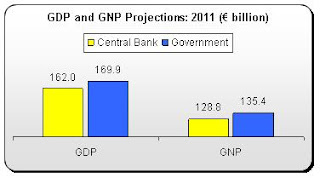Michael Taft: No doubt the Government will blame the need for increased contraction through a multi-annual budget on the banking crisis. There certainly is a good reason doing so – the banking crisis impacts on finances in a number of ways: debt addition, interest payment, addition, impact on bond yields, output depression and opportunity costs to beat the band. But don’t buy into the diversion. The blame lies with the Government’s own fiscal policy – a deflationary strategy that has proven self-defeating.
One of the central contentions on this blog is that deflationary policies will do just that – deflate the economy. They will depress growth which, in turn will depress tax revenue while increasing public expenditure through higher unemployment costs arising from the low level of output. Recent estimates from the Central Bank (and, no doubt, data that only the Government has sight of) is starting to show this. Growth figures are coming in well below Government projections in the last budget.
Nominally, the economy will be much lower than the Government originally projected. This is particularly borne out by key domestic indicators:
As can be seen, every indicator is going south. While the Government expected consumer spending to increase towards 3 percent, the Central Bank estimates that it will be effectively stagnant. Critically, while the Government estimated investment to grow by over 4 percent, the Central Bank estimates it will still be negative. The result is that the Central Bank estimates the domestic economy will grow at about half the rate as the Government hoped.
What does this mean for the deficit next year? The Central Bank doesn’t give an estimate. But even if the Government’s budgetary targets are met (tax revenue, current and capital spending) the deficit will start to rise – merely as a function of lower GDP. Instead of being -10 percent as the Government hoped, it will be -10.5 percent.
However, if the Government’s own tax revenue ratio holds (i.e. tax revenue as a percentage of GDP – the Government uses a ratio of 19.3 percent between 2010 and 2014), then the real trouble starts. With the deflated GDP, tax revenue will undershoot by €1.5 billion. If this holds, then the deficit will slide back to levels this year. In other words, there will be no progress on the public finances. In fact, it could be even worse.
The Government hoped that employment would rise by approximately 18,000 in 2011. The Central Bank estimates it will continue declining – by 7,000. Unless emigration increases, unemployment could rise – increasing public spending above what the Government estimated, thus adding even more to the deficit.
So, all that pain and no gain at all. And none of the above counts the cost of the banking crisis. Now, throw in the cost of that – the extra interest payments, the higher rates on Government borrowing and no wonder the Government is going back to the drawing board. Because all its current projections are beyond repair.
This is the result of the Government’s deflationary policies – the very deflation demanded by commentators, analysts and politicians on both sides of the house. If the Government continues to pursue this strategy through a multi-annual programme, then it will be continuing policies that have failed to date.
And if the Opposition parties buy into this – in the name of a ‘national consensus’ – they will be aiding and abetting what is essentially a crime against the economy.



3 comments:
Michael,
My comment:
http://www.progressive-economy.ie/2010/09/governor-is-wrong.html?showComment=1286009646117#c5389047010456512563
on your previous post about Governor Honohan being wrong - to which you did not respond - is equally relevant here.
The following Eurostat data on comparative price levels:
http://epp.eurostat.ec.europa.eu/tgm/table.do?tab=table&init=1&plugin=1&language=en&pcode=tsier010
shows the price level for Irish domestic consumption staying stubbornly (15-16%) above the EZ average.
We are locked into the Eurozone; do you think we could back back the €100 bn + of liquidity support from the ECB immediately? Stripping out excessive costs and inefficiencies in the state, semi-state and private sheltered sectors would get prices down to the EZ average, increase real disposable incomes for all and boost domestic and international competitiveness.
The progressive-left stance of bleating about the impact of cuts on the poor and unemployed while protecting the status quo in the state and semi-state sectors is as reprehensible as the consensus forming on fiscal adjustment that ignores these excessive costs and prices.
@ Paul Hunt
Perhaps I'm being a bit pedantic, but the comparative price levels do not specifically refer to consumer prices. I don't think this really effects the point you are making however.
Regarding your point more directly, I wrote something 'Wages in the Crisis' which shows that Ireland's loss of competitiveness with respect to Germany was more to do with the product market than the labour market. I do think that Irish competition policy is a bit of a joke in that the regulator prohibits the ESB from reducing prices so that we can benefit from lower prices.
Apart from state sector, what areas in the private sector do you consider to be sheltered? Pubs? Retail?
@Rory,
I think you half-heartedly take my point that it is not really pay and wages that are the issue - they are broadly in line with EZ averages (even if there are difficult-to-quantify productivity issues in some sectors); it is the impact of excessive costs and prices in some sectors on the real disposable incomes of households.
And as to the ESB, you might find this enlightening:
http://www.irisheconomy.ie/index.php/2010/10/08/paul-hunt-submission-to-an-bord-strip/
Semi-state restructuring seems too complex for the posters here, but the current situation is unsustainable.
And as for the sheltered private sectors, you mustn't have been following previous posts on this board which seem to focus on property and rents, but don't mention private financial and insurance service or the legal, medical, pharmacy areas.
Post a Comment